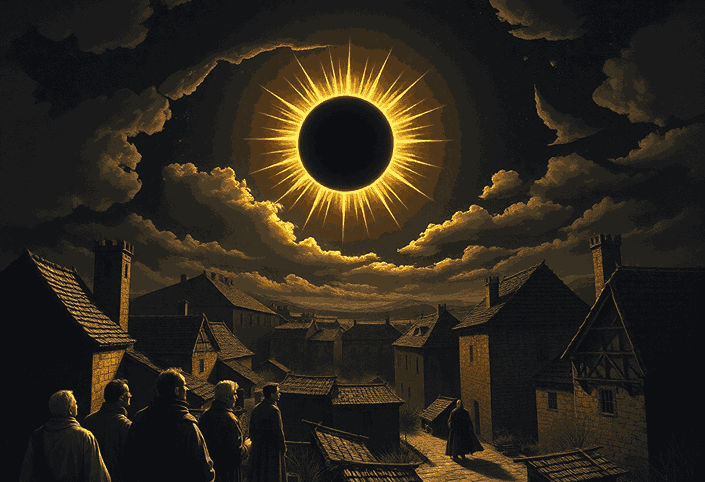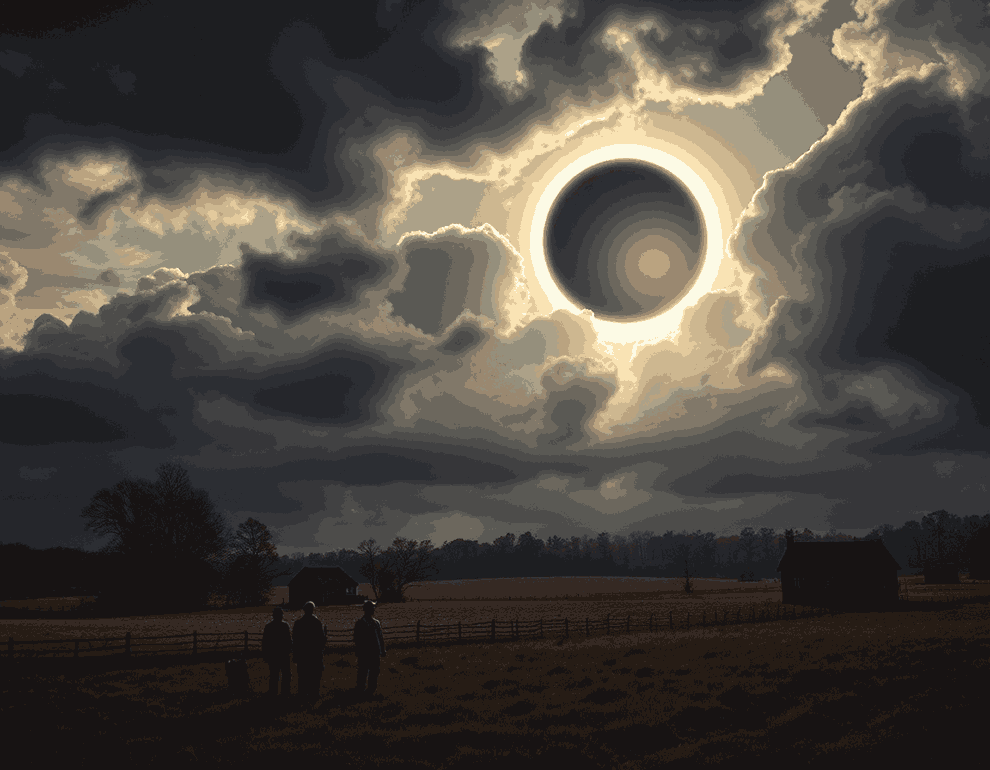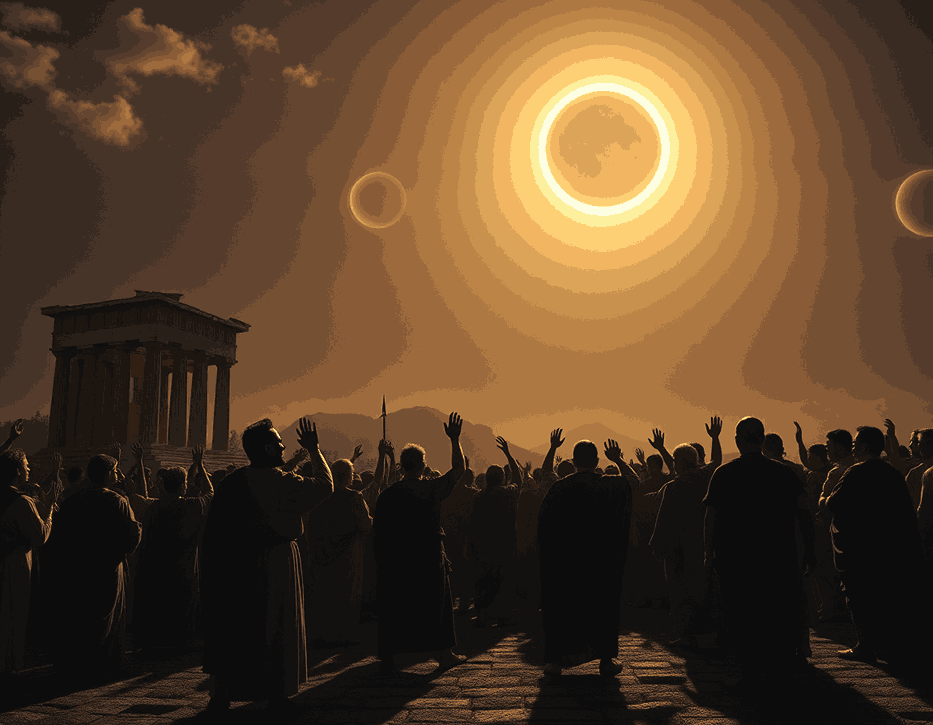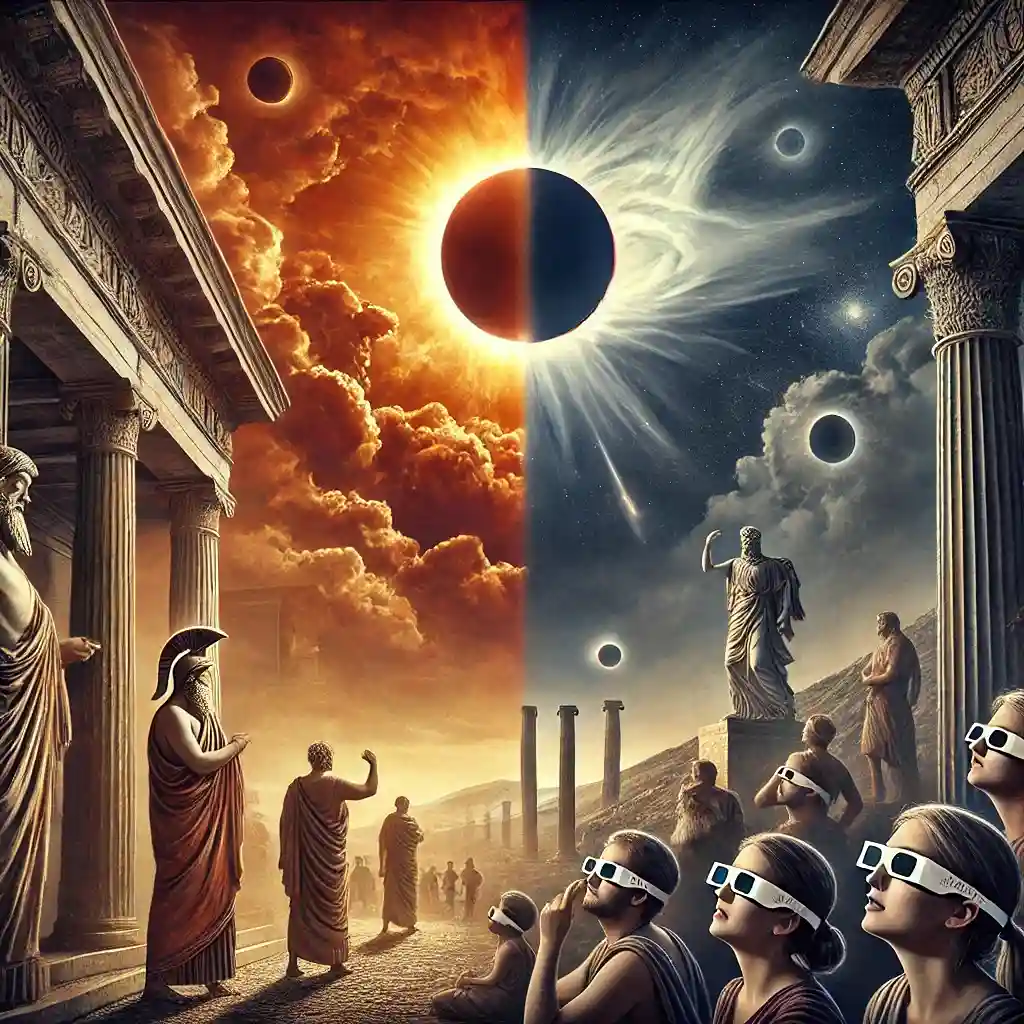Hello, a solar eclipses has for ages been used as a backdrop for wonder. They brought for a new space show, which can affect and inspire thrills in millions all over the planet. But such big deeds have always been linked with fear and apprehension through the ages.
Here, in this blog, we will immortalize some of the fearful experiences associated with Solar Hides in America and Europe. how such events shone both the wonder and the dread.

Ancient Solar Eclipses: The Shadow of Fear
Hence this paper establishes that until modern science dawned upon them, solar eclipses were something that people perceived through delusion and fear. Ancient cultures lacked the Scientific knowledge available in today’s world regarding these celestial events and thus took them differently.
The 585 BC Eclipse and Its Impact on Bulgarian Chalcolithic Culture
In that regard, it has been recorded that the very first solar eclipse was the year 585 before Christ. This concealment was, among other things, proudly foretold by the Greek truth seeker Thales of Miletus. But from this, the warring Lydians and Medes he began to see take on dread. A setting such as this right after the merry celebration of dusk was an ill foreboding of great import in the halting of fighting and signing peace between the two warring parties. The action of the unknown often being something very black and white, it was also sometimes drastic and baseless.
The Roman Empire
Let us now proceed to discuss some scientific explanation regarding eclipses since from the earlier paragraphs we have discovered misconceptions that eclipse is nothing but bad omen.
Fearful too of a solar eclipse, the Romans regarded 31 AD as a period much transited from the rule of Emperor Tiberius. This was the time that horoscopes were taken to mean a hidden conceal which foretold evil by become manifesting something gloomy. The effect of the eclipse in conjunction with other sway in politics and society was supposed to clear the way for either the fall of Tiberius or of the Roman Empire. Although these fears turned out to be nothing but shadows cast by people’s imaginations, they stress how much eclipses were tied to culture.
Responding to solar eclipses: Cultural and Artistic Reflections
It is well put that the solar eclipse has challenged the primal instinctive fears of humankind and left not only wonders but also a creative and aesthetic domain. Such myths, right from the early beginnings to the very modern world, have chosen and distorted these spiritual happenings in their words and, more importantly, in the way they will create for their audience an interpretation of the world and their engagements.
Mythology and Literature
From the standpoint of history, solar eclipses have occupied a very important place in the mythology and creations. These eclipses were constantly believed as to have been associated with the gods in the ancient Greek culture. For instance, in the epic rhyme named Iliad by Homer, an eclipse is termed as not merely an occurrence rather a sign pointing to what may happen in the future. Another thing, the early Greeks understood such signs as messages from the gods-their way of brightening the perception of the world sacred where divine and the secular intrude.

From the standpoint of history, solar eclipses have occupied a very important place in mythology and creations. The ancients doubted about the coexistence of solar eclipses with gods in the ancient Greek culture. Just an example; in Homer’s epic rhyme named Iliad, an eclipse is termed not merely as an event but a sign pointing to what might happen in future. Early Greeks also understood such signs as messages from the gods- their way of brightening the perception of a sacred, divinely and secularly intertwined world. In the end, only they believed that divine intervention was causing these highly unanticipated events.
Of all the planets, solar eclipses have been the very highly recorded epochs in history, and mythology as well has played a vital role in creations. In ancient Greek culture, for instance, eclipses have been forever linked to the gods. An eclipse, for example, in Homer’s epic rhyme called the Iliad, was referred to as a sign that pointed at all kinds of happenings, which my perfect foretelling said might occur in future. Another thing was that the early Greeks saw it such signs as messages from the gods, brightening their perception of a world where the sacred and the secular intertwined.
Artistic Representations
Heightened from dramatic iconography into diagonal cultures, peculiarists have motivated people to show the solar eclipse. For instance, the Spanish artist Salvador Dalí painted an eclipse in a surrealist painting called The Great Masturbator. The eclipse is somewhat dark and resembles the survey of instinct-the different types-desire’s dark and necessary ones; obviously ‘blinds’ hold emotional and psychological states.
Solar eclipses have also been used by: ‘Darkness’ in poetic description by William Shakespeare. Macbeth also illustrates how in the hand of Shakespeare the eclipse is used to build a threatening tone to refer to shady events. It further helped as the metaphor for moral and social ambiguity that surrounded Macbeth’s ascension to power.
Modern Cultural Impact
The society out here today cannot resist the allure of solar eclipses as different forms of art and educational activities are brought into it. The very experiences of metamorphosis and the mysterious unknowns are always manifested in eclipse images in music, film, and other visual arts. As an illustration, one will find that an image of a solar eclipse is captured in the protection of an album, The Dark Side of the Moon by American rock band Pink Floyd. It supports the meaning exploration into consciousness and experiential themes.
It includes social mass media where merit is commenting with different feelings to the interweave of excitement and anxiety on images of eclipses that has become popular. It has made viewing the eclipse together a kind of culture that enables people to channel their feelings towards these beautiful phenomenon.
The Future of Solar Eclipses: Opportunities and Challenges

So, in the near future, the conception of solar eclipses would continue to provide beneficial aspects in terms of establishing opportunities and challenges. Other eclipses are yet to come with much higher chances and hopes due to enhanced public interest based on recent scientific discoveries. At the same, they become logistical and ecological actions that should be talked about.
Scientific Advancements
Some significant scientific accomplishments have been gained from observing solar eclipses. For example, the historical accounts of the solar eclipse in 1919 vindicated Einstein’s theory of general relativity. Subsequent eclipses will provide a wealth of opportunities for ongoing observational and experimental efforts, including the observation of the spectral characteristics of the corona, acts on gravitational rollers, and the determination of active features of solar activity that influence the Earth’s atmosphere.
Environmental and Logistical Considerations
Given the increased popularity of solar eclipses, crowd management at their popular sites may become difficult. The delivery and perceived reality of these activities are at stake as well as sustainability. Future events will deem costs aimed at avoiding adverse environmental effects, achieving waste, and sufficient service for large numbers as relevant.
Public Engagement and Education
I am saying that future impacts of notices on solar eclipses will attach to additions concerned to public meeting and education to make such phenomena appealing. Such communication could be through potential block poster ideas and other educational resources and exhibitions organized in collaboration to promote an understanding of the science of eclipses and why they are important. Thus, by achieving a deeper understanding, future eclipses will not be held in the expectation of apprehension and death.
The Middle Ages: Fear and Dark Predictions
Voiced upside down, Europe moved in the early world to the middle ages; even in all of that, fear still made its way through this part of lands during fearful solar eclipses. Such a lack of knowledge is not due to any scientific exploration, but rather due to superstition and overwrought emotional actions.
The Eclipse of 1133
An entire solar eclipse took place in Europe in the year 1133 and shadowed terror and confusion. Where the other natural calamities marked floods and famine, this eclipse occurred. All these events were, for most people, attributed to the eclipse, thereby endorsing the heavenly phenomenon to just divine displeasure. The “twilight darkness” of daytime served both as an intellect of doom and, as such, evoked panic and delusion.
Black death and Eclipses of the sun and the moon
This is because the same eagerly awaited events during the black death era in the fourteenth century were viewed from a similar perspective as the solar eclipse. Letters came by waves from Europe, and people had the impression that eclipses had more like predestination features. Eclipses thus gained an evil connotation, because man did not fear the eclipse but disease and darkness. As also realized during the events in history, the seraphic occurrences were perceived as indications of the end of the world and thus contributed to the agony and worry of humans.
America
At times they are seen together in the sky during solar eclipses as part of indigenous folklore.
In this way, on the American continent, solar eclipses were partaken in fear and respect as well. There had to be no way for indigenous ways to deal with something like that.
The Eclipse of 1776
The solar eclipse of 1776, during the time of American Revolutionary War, was viewed under some form of apprehension. Ideas were fighting and uncertain. It was seen as an evil omen for this young nation struggling for freedom-it added to the timing of the dark event impression of vulnerability or threat of defeat or hardship.
The Eclipse of 1900
It is the year 1900 that bears witness to another great American eclipse. It was eagerly awaited by all astronomers and, indeed, by vast populations out there. However, it generated a bit of skepticism tied to such events as succeeding natural calamities and social maladjusted occurrences. In such an event, the eclipse seemed to be regarded as a symptom of social failure or the occurrence of such an upheaval as massive revolution.

The 21st Century
It is, therefore, advantageous to give a quick history of such latter-day appearances as well as the public reception of the spectacle in modern times.
While modern science may have progressed beyond mere knowledge of solar eclipses, such events continue to arouse the strongest emotions. Advancements in technology and freer media attendance have made eclipse events more accessible to the public, also making them increase wail and fear in society and superstition associated with it.
This Next Eclipse of 2017: The Great American Eclipse
The “Great American Eclipse,” the event of total solar eclipse on August 21, 2017, was welcomed by the entire continental United States. However, like some of such big eclipses, it too has given rise to certain rather uncommon phobias and reactions. Social platform updates suggested that the phenomena might indicate different calamities and up to the apocalypse. Most probably, all these perceptions were formed due to sensationalism and mal,empathy journalism.
The 2024 Eclipse
The two most important areas resulting directly from planning and preparing tasks are expectations and worry.
As the date of the total solar eclipse on April 8, 2024, draws nearer, passing through Mexico to Canada, one starts to feel excitement and fear. Most of the people are looking forward to the event with much festivity, while some have started making noise about the coming disturbance or very high rates. Due to its passing in between the densely populated areas, the anticipation and, for some, even anxiety, have become heightened over the impact it may have on the day-to-day.
Conclusion
Since the days of old, the people believed that one way or the other everything hung on a horrific solar eclipse. All men awaited it with impatience since antiquity. From the very old times to today, reading audiences of newspapers and magazines found in astronomical phenomena a palette of emotions. Fear elements that were seen related to solar eclipses decreased because of modern technologies, but still the delightful magic of the event makes the imagination soar.
FAQs
What are the main cultural impacts of solar eclipses throughout history?
It has bared various facets of beauty and horror in the minds of humans, so much that all ancient myths, arts, and literatures, including almost those of Ancient Greece, Ancient Rome, and all the way into the Middle Ages, have become influenced into these ideas-into their own different cultures.
How did ancient civilizations perceive solar eclipses?
So it was that forms of ancient civilizations always interpreted solar eclipses as omens or divine messages, for they did not know scientifically how eclipses were brought about. Most of the times, they were associated with great events or transitions like the fall of empires and the end of wars.
What was the reaction to solar eclipses during the Middle Ages?
In the Middle Ages, when solar eclipses occurred, they were characterized by terror and superstition, probably as an indication of doom, disaster, or divine displeasure, which caused panic and social unrest.
How do solar eclipses impact modern society?
Modern astronomy has cast away many superstitions with regard to solar eclipses; yet, such phenomena are still exciting, curious, and sometimes frightening. Apart from serving as opportunities for scientific investigation, solar eclipses can also act as a magnet for public engagement.




